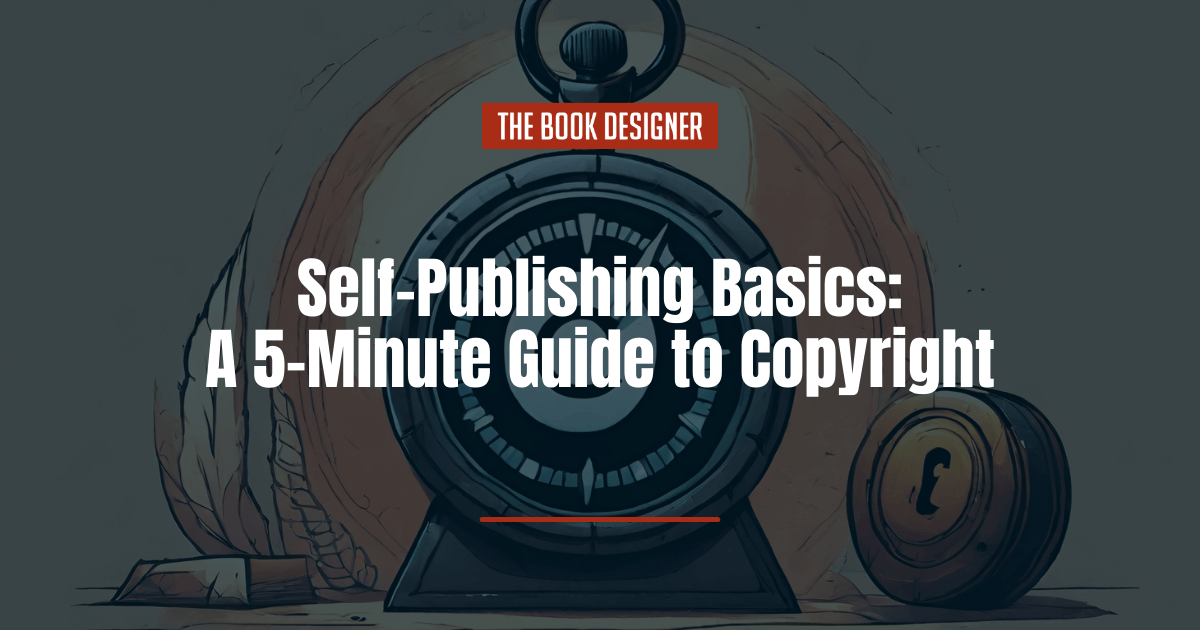Well, we’re all busy and who has time to research copyright? This is the province of lawyers, big publishers with legal departments, and plagiarism checkers, isn’t it?
No, every self-publisher needs to have a bit of information on copyright and the way the law works in the United States. Okay, I promised this would take 5 minutes, so let’s get started.
In this article, we’ll cover the basics of copyright law for self-published authors:
Basic Copyright Information You Should Know
Copyright is a form of protection for intellectual property. It is based in the U.S. Constitution, and by law grants protection for original works fixed in any tangible medium of expression. Copyright covers both published and unpublished works.
You do not have to apply for copyright from any authority. The U.S. Government does not issue copyright. The law of copyright automatically provides protection from others who might claim your work as their own, or seek to profit from your work without your permission.
When you create something original and fix it in some form that others can experience (for instance, by writing a story that others can read or painting a picture that others can view), your work is under copyright protection from the moment it is created.
Copyright protects original works of all kinds including literary, dramatic, musical, and artistic works, such as poetry, novels, movies, songs, computer software, and architecture. It will protect a greeting card verse you wrote or the song you’ve created for a school play.
Copyright Does Not Protect Everything
Copyright doesn’t protect facts, ideas, systems, or methods of operation. However, it will protect a book or operating manual that explains these ideas, systems, or methods.
As publishers, it’s important to know that you cannot copyright the title of your book. If a title could be considered a trademark, you can use the trademark system to attempt to protect your title, but it will be an expensive, lengthy, and uncertain process, and you may well be denied trademark protection.
Some Copyright Questions and Answers
Below we’ll cover a few common questions about copyright, including some misconceptions.
How is Copyright Different From a Patent or Trademark?
Copyright protects original works of authorship. Patents protect inventions or discoveries. Ideas and discoveries are not protected by copyright law, although the way in which they are expressed may be. A trademark protects words, phrases, symbols, or designs that identify goods or services. The Fedex logo is a registered trademark, which provides protection. It is not copyrightable.
What is Copyright Registration?
There is no requirement to register your copyright, which exists from the moment the work is created. Registration is a service provided by the Library of Congress as a means to record claims to copyright. If you ever have a dispute about your copyrighted work, your best evidence is going to be the registration you made—and the date it was entered—to show you are the originator of the work.
You definitely want to register your copyright, even though it isn’t required.
- Copyright registration will put the facts of your copyright into the public record
- You will receive a certificate of registration
- In the event of litigation, your registered work may be eligible for statutory damages and attorney’s fees
- If you register your copyright within 5 years of publication, it is considered prima facie evidence (self-evident from the registration) in a court of law
Can’t You Just Mail Your Manuscript to Yourself?
This practice has been used for many years as kind of a “poor man’s copyright.” Unfortunately, there is no provision in the copyright law for any such protection—it is not a substitute for registration. In fact, in order to bring an infringement case in Federal Court in the U.S., you’ll need to have registered your copyright with the Copyright Office. Of course, if you’re accused of plagiarizing someone else’s work, a mailed (unopened) copy of your manuscript may help establish when your work was created.
Is My Copyright Good Outside the United States?
The United States has copyright relations with most countries throughout the world, and as a result of these agreements, we honor each other’s citizens’ copyrights. However, the United States does not have such copyright relationships with every country. For a listing of countries and the nature of their copyright relations with the United States, see Circular 38a, International Copyright Relations of the United States.
Final Thoughts
Well, there you have it. Considering the amount of time, effort, and imagination you’ve put into your book, it makes sense to take the simple step of registering your copyright and adding a copyright page. Like putting a category on the back cover of your book, or getting your ISBN correct, this is another detail that self-publishers just have to attend to.
In an upcoming post, we’ll discuss the rather thorny issue of fair use. In the meantime, if you have copyright questions it’s best to consult an attorney, and I am not an attorney. For more detailed information on copyright, visit the U.S. Copyright Office website.
Editor’s note: This article was originally written by Joel Friedlander in 2009 and has been updated by The Book Designer editorial team.




